To Hold the Bridge Read online
Page 2
‘My grandmother—’ said Morghan.
‘Yes, yes,’ Famagus interrupted. He groaned again as he stood up, and tottered down several steps to pick up a very large and thick ledger that was bound in mottled hide and reinforced with bronze studs and corner-guards. He opened this expertly at almost the right place, turned two pages, and ran his index finger along the lines recorded there.
‘Share Four Hundred and Twenty-One, dividends anticipated for the next seven years, the maximum permitted, paid to one Hirghan, son of Sabela—’
‘My father—’
‘Care of the Three Coins, an inn in Belisaere,’ concluded Famagus. He shut the ledger with a snap, put it down, and yawned widely.
‘This share is essentially worthless,’ said Amiel. ‘Your father borrowed from the company against it, and it cannot be redeemed or sold until that sum is repaid.’
Morghan’s hand shook as he took the paper back. He sucked in an urgent breath, and just managed to stutter out what he had come to say.
‘I – I don’t want money… I want to join the company.’
Amiel looked him up and down. Though her gaze was neutral, neither scornful nor encouraging, Morghan blinked uneasily, knowing that what she saw was not promising. He was tall and thin and did not look strong, though in fact he had the same wiry strength and constitution that had allowed his father to take far longer to drink himself to death than should otherwise have been the case. His dark eyes came from his mother, though not her beauty, and he had nothing of the selfishness and cruel disregard for others that had been the strongest characteristic of both his parents.
‘You want to enroll as a cadet in the company?’ asked Amiel. ‘The indenture is five years, and there’s no pay in that time. Board, lodging, and equipment, that’s all.’
‘Yes,’ said Morghan. It was precisely the certainty of food and a roof over his head that he sought. ‘I know.’
The Bridgemistress looked at him with those fierce blue eyes. Morghan met her gaze, though he found it very difficult. Somehow he knew that if he looked away, whatever slim chance he had would be gone.
‘Very well,’ said Amiel slowly. ‘We’d best see if you are suitable. It is no small thing to be a cadet of the company. Come.’
She led the way across the landing into a roomy chamber that had tall windows overlooking the front courtyard. There was a desk against one wall, with several neatly organized stacks of paper arranged on its surface, lined up behind an ink-stained green blotter that had a half-written letter secured upon it by a bronze paperweight in the shape of a nine-arched bridge. A bookshelf occupied the opposite wall, the top shelf taken by a case of swords and the lower shelves occupied by at least a hundred volumes of various sizes and bindings.
‘Do you have any knowledge of the art mathematica?’ asked Amiel. She ushered Morghan into the room and went to the bookshelf to take down a small volume.
‘Yes, milady,’ answered Morghan. ‘I have studied at the Academy of Magister Emaun in Belisaere for the past six years.’
‘You have a letter attesting to your studies with the Magister?’ asked Amiel.
Morghan wet his lips.
‘N-no, milady. I was not a paying pupil. I – I worked in the kitchens and yard for the Magister, from dawn to noon, and attended lessons thereafter.’
He did not mention that the Magister’s lessons had been erratic and depended much on his whim. Morghan had learned more by himself than he had ever been taught, but at least working for the Academy had gained him access to the Magister’s library. He had worked more regularly and longer hours at the Three Coins, where his parents were sometimes guests and always debtors. He knew stables and cellar better than any schoolroom. He had also learned more at the inn than from the academy. Hrymkir the innkeeper was an educated and well-traveled man, and, as a former guardsman, both an experienced fighter and a minor Charter Mage. He had passed much of his knowledge on to Morghan, in return for his work as stable hand, potboy, and occasional cook. The lessons were all the pay Morghan ever saw, though his labor supposedly helped to reduce his parents’ debt.
‘Then we shall see what you have learned,’ said Amiel. She flicked through the pages of the book and placed it open on the desk, next to a writing case and a sheaf of paper offcuts, intended for informal notes or jottings. ‘Prepare your paper, cut a new pen, and answer the mathematical problems set out on these two pages. You may have until the noon bell to finish.’
Morghan glanced out the casement window at the sun, which was already rather high. Noon could not be far off. He took off his sword-belt and leaned the weapon against the desk, hilt ready to hand, before he sat down on the polished, high-backed chair and leaned over the desk to focus on the open book. His hand shook as he drew the volume closer. But the shaking eased as Morghan read, and he found that he readily understood the problems. They were not particularly difficult, but there were eleven questions, addressing various matters of practical geometry, calculation, and mathematical logic, though all in practical settings, concerned with the wages of artisans and laborers, the cost and quantity of goods, the time required for works, and so on. All the questions required a lengthy series of workings to arrive at the correct solution or solutions.
Morghan was halfway through question six when the great bell in the tower above the town’s citadel boomed out, its deep voice sounding to him like the roar of one of the disgruntled customers at the Three Coins upon discovering their ale had been watered beyond even their low expectations.
The young man set his pen down and dropped a pinch of sand on his current paper. Four other sheets lay to the side, covered in his careful script. Morghan was fairly confident he had answered the questions correctly, but he hadn’t finished, and his stomach knotted as he waited for Amiel to come in and dismiss his pathetic effort.
The Bridgemistress strode in before the echo of the bell had faded and, without speaking, picked up the papers and looked through them. As she finished each sheet, she let it fall back onto the desk. Morghan sat uncomfortably, watching her.
Amiel dropped the last page and looked down at Morghan.
‘I – I didn’t finish …,’ stammered Morghan.
‘You’ve done well,’ said Amiel. ‘If you had done more, or shown less of your working, I would have suspected you of reading the explicatory chapters at the back. Now, your mark is true. I presume you also studied Charter Magic with Magister Emaun?’
‘A little, milady,’ said Morghan. ‘It … it is not the fashion in Belisaere these last few years—’
‘Fashion?’ snorted Amiel. ‘By the Charter! If some of those guild popinjays ever left the peninsula they’d … well, you say you did some study?’
‘Yes, milady, but not much at the Academy. The innkeeper at the Coins, where we lived, he was a retired guardsman. He taught me a lot of things, and my father … my father did give me a book once, a primer of a thousand useful marks.’
‘Do you still have it?’ asked Amiel.
Morghan shook his head. ‘He took it back, to sell it.’
‘How many Charter marks do you remember?’
Morghan blinked in surprise.
‘All of them. I had the book for almost a year.’
‘Then you had best show me,’ said Amiel. ‘Not here. We will go into the inner court, and I will also have Sergeant Ishring test your skill with weapons.’
Morghan nodded and made a curious movement with his left arm, raising and lowering it with a rotation outward. Amiel noticed it, but did not comment. Instead she turned away to lead the young man through the house, out onto a squat tower at the back where two sentries watched. Their crossbows lay ready in the embrasures and each had a dozen quarrels neatly stood up against the wall, ready to hand.
‘All’s well, Bridgemistress,’ reported the closer guard as Amiel and Morghan stepped out.
‘Good,’ said Amiel. She looked over the crenellated wall, and Morghan did likewise. The inner court was a large grassed area, the
grass worn to dirt in patches, behind the house proper but within the perimeter wall. There were sentries on the outer wall as well, walking the ramparts, and more atop a taller square tower in the northeast corner.
Morghan wondered why the sentries were necessary. After all, the Bridge House was well within the town’s own walls, which were in good repair and patrolled; and it was also well protected against the Dead or Free Magic creatures, being inside both the main aqueduct ring and a smaller one that encircled the Bridge House and several of its neighbors, which were also the headquarters of other major commercial operations.
‘We are a rich company,’ said Amiel, answering his unspoken question as they descended the steps to the courtyard, pausing at the bottom for the iron-studded door to be unlocked. ‘Wealth attracts trouble, of every stripe, and lack of the same can make even the most steadfast stray. We must always be on guard.’
Morghan nodded. The courtyard was empty save for one very broad-shouldered man with a short neck. Unlike the other guards, who wore tan surcoats over mail, he had on a knee-length coat of gethre plates that rippled as he moved. He was chopping at a pell – a target post – with a poleaxe, sending chips flying from the tough wood on both sides as he switched his angle of attack. He made it look effortless.
‘That’s Ishring, my Sergeant-at-Arms,’ said Amiel. ‘Come on.’
Morghan followed, nervously touching the hilt of his practice sword. He was reasonably competent with swords and short blades, but he’d never wielded a poleaxe. He rotated his left arm again, trying to loosen the elbow as much as he could. A poleaxe needed the full strength and flexibility of two good arms.
As they stepped out into the courtyard, Ishring stabbed the pell at eye-height with the spear point of the poleaxe, then stepped back to the guard position and swiveled on his left foot to face Amiel and Morghan, though as far as Morghan could tell no one had warned him of their approach and he doubted their footsteps could have been heard over the sound of the chopping and striking at the pell.
‘Bridgemistress!’ bellowed Ishring, slapping the shaft of his pole-arm in salute.
‘Sergeant,’ acknowledged Amiel. ‘This is Morghan, a potential cadet to be put to the test. Arms first, I think, and then I shall assay his knowledge of the Charter.’
‘You know how to use that sword, Morghan?’ asked Ishring.
‘Ah … yes—’ began Morghan. Out of the corner of his eye he saw Amiel step smartly away from him, and a more complete answer faltered and remained unspoken.
‘Use it, then!’ bellowed Ishring, and suddenly swung the poleaxe toward Morghan’s head, though not directly at it. Morghan jumped back and drew his sword, ducked under another swing and scrabbled sideways.
Ishring backed away, poleaxe at guard once more. Morghan eyed him warily, keeping his sword high.
‘How do you deal with an opponent who has a longer weapon or greater reach?’ asked Ishring.
Morghan gulped, and kept watching the sergeant’s eyes.
‘Get in close,’ he said.
‘What are you waiting for, then?’ taunted Ishring. He began to circle around the young man. Morghan circled the other way, so as not to be maneuvered into facing the sun, and when Ishring circled back, he feinted a lunge at the sergeant’s knee, which he hoped would provoke a counter and provide an opening for a proper attack. But Ishring merely stepped back just far enough to avoid this strategy and kept his poleaxe ready.
‘Nasty thing, a poleaxe,’ said Ishring conversationally, as they circled around each other. ‘We need them to crack open the nomad spirit-walkers, but they’ll do fearful damage to unarmored flesh and bone, shockin—’
He swung in midword, without any telltale tensing of muscle or flicker of eye. Morghan jumped back and stepped back again as the axe blade came whistling in from the other side, then before it could come again, he leaped forward with his sword shortened to stab, and then he was lying dazed on the ground, uncertain what had actually happened other than the blunt haft of the poleaxe beating his blade aside and tapping him behind the knee.
Instinct made him roll away, a good response, as the spearpoint of Ishring’s poleaxe stabbed the ground where he’d been, though it was more punctuation than an actual attack. Morghan knew it would already have been in his throat in a real combat.
‘Good enough,’ boomed Ishring. He stepped well back. ‘Sheathe your blade.’
Morghan returned his sword to its scabbard with a shaking hand. He could feel blood trickling down his chin. He wiped it away, the slight stain of bright red confirming that it was only a graze from his fall.
‘You move quite well,’ said Ishring. ‘But you hold your left arm strangely. You have injured your elbow?’
Morghan looked down. He had hoped they would not notice, at least not immediately, but he should have known that an armsmaster like Ishring would spot it straight away.
‘My elbow was broken,’ he said. ‘A long time ago, and not set properly.’
‘Hold out your arm,’ commanded Ishring. ‘Grip my hand. Hard as you can.’
Morghan did as he was told. He could not completely straighten his left arm, but he had worked very hard to make sure that his left hand was as strong or stronger than his right.
Ishring probed around his elbow joint, pushing with his fingers. It hurt, but no more than it would have hurt his other elbow.
‘Old break, grown wrong,’ confirmed Ishring to Amiel. She came over and prodded as well, while Morghan stood there, scarlet-faced.
‘Why was it not mended?’ asked Amiel. ‘A simple spell, at the time, and it would have reknit.’
‘It was an accident,’ mumbled Morghan. ‘My mother was … was ill, and didn’t mean to hit me. My father wasn’t home. No one tended to it for days, and then … there was no money …’
‘How old were you?’ asked Amiel.
‘Nine or ten,’ said Morghan. He remembered every detail of what had happened, but not exactly when it was. His mother had been taking some concoction that addled her wits and had lashed out at him with a curtain rod, thinking he was someone – or something – else, and had then lapsed into a drugged coma for three days. She had been lucky to survive, and he had been fortunate not to lose his arm completely by the time his father returned and belatedly sought help. They had been living in a grace and favor house of his grandmother’s then, on the sea cliffs near Orchyre, a beautiful but lonely spot with no near neighbors.
‘It could perhaps be made new, but it is far beyond my skill,’ said Amiel. ‘It really should have been dealt with at the time. The Infirmarian at the Glacier might be able to do something …’
Morghan nodded glumly. He knew that only a most powerful and experienced Charter Mage, one who was also a surgeon, might be able to mend his elbow. The Infirmarian of the Clayr, off in their remote glacier home, would be one such possibility. But the Clayr demanded payment for all their services, be it foretelling, research in their famed library, or anything else.
He had once thought to petition the King in Belisaere to be healed. There was a tradition that the ruler of the Old Kingdom would consider such petitions on certain feast days, but Morghan had found that in modern times, putting the petition into the hands of the right people who would convey it to the King cost far more money than he had ever had. Besides, the King, though a powerful Charter Mage, was not a surgeon.
With his weak elbow known, he supposed that Amiel would now decide he was unfit to join the Bridge Company, and he would have to come up with some other plan. The only problem was that he couldn’t think of anything else. Joining the company had seemed the one possibility that might lead to decent work and regular meals. If he failed here then he supposed he could try to gain employment in an inn or tavern. He knew the work, after all. But such relatively unskilled jobs always had many takers, and he had seen enough beggars in the walk from the docks to know that there were few prospects in Navis, and he had no money for the return journey to Belisaere. It would be a long and hungry
walk back to the capital, if he had to make it – though with winter coming, he would probably die of cold before he had the chance to starve.
Morghan stood and tried to be stoic, preparing himself for the bad news. Perhaps he could begin his begging here, and ask for a loaf and cheese, to see him on his way. They were certainly loading provisions enough in the front courtyard.
‘Try the poleaxe,’ said Ishring unexpectedly. Amiel said nothing.
‘Uh, on the pell?’ asked Morghan. He took the poleaxe, forehead knitting as he felt its weight. It was much heavier at the head than the axe he had used to split wood at the Three Coins, but the shaft was also longer and had a counterweighted spike, so its balance was far superior.
‘On the pell,’ confirmed Ishring. ‘Three strokes to the left, three strokes to the right, and finish by jamming the spear into the middle, hard as you can.’
‘Hard enough to stay there?’ asked Morghan doubtfully. He had done little spear work, but the old guard who had taught him had been insistent that you thrust a spear in only as far as you could pull it out, to avoid disarming yourself in the middle of a battle.
‘Aye, for this test,’ said Ishring. ‘But it is good you asked the question.’
Morghan took a deep breath, stepped forward, and swung, rapidly delivering three hefty chops to the left side of the pell. As he had expected, they were not quite as powerful as they would have been if he could straighten his left arm, but a satisfying number of wood chips flew from the timber.
Reversing the momentum of the poleaxe was also tricky, but Morghan managed it, rolling his wrists and pivoting on his foot to address the right side of the pell. But his first swing was weak, and at a bad angle, so that the axe-blade was almost pinched, caught in the tightly grained wood. Desperately, he wrenched it free, though it put him off-balance. He almost panicked and swung back immediately, but all the lessons in the inn courtyard had their effect. He almost heard Hrymkir bellowing at him to calm down, that balance was more important than sheer speed.
Morghan regained his focus, delivered two more forceful strikes, then rammed the spear-point of the poleaxe as hard as he could at the very middle of the pell. The impact jarred his hands and he felt a savage jab of pain in his bad elbow, but he held on long enough to make sure the weapon was firmly embedded before he let it go, the shaft quivering as it slowly leaned toward the ground. But the spear-point did not come out.

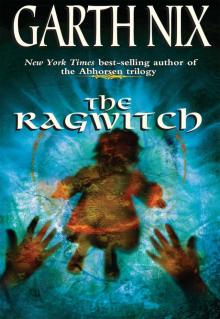 The Ragwitch
The Ragwitch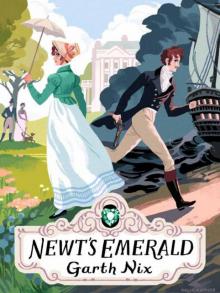 Newt's Emerald
Newt's Emerald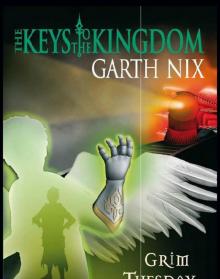 Grim Tuesday
Grim Tuesday Sabriel
Sabriel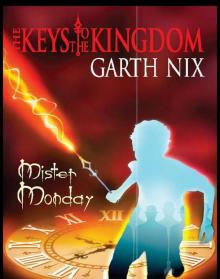 Mister Monday
Mister Monday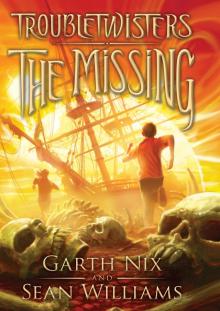 The Missing
The Missing The Fall
The Fall A Confusion of Princes
A Confusion of Princes Troubletwisters
Troubletwisters Lirael
Lirael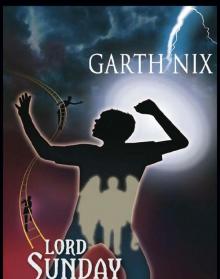 Lord Sunday
Lord Sunday Clariel
Clariel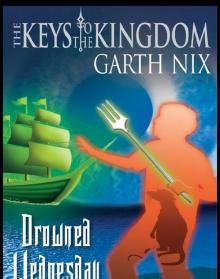 Drowned Wednesday
Drowned Wednesday Shade's Children
Shade's Children The Violet Keystone
The Violet Keystone Abhorsen
Abhorsen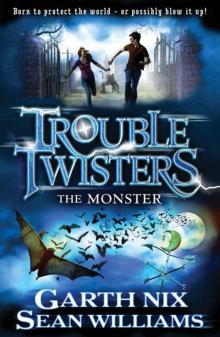 The Monster
The Monster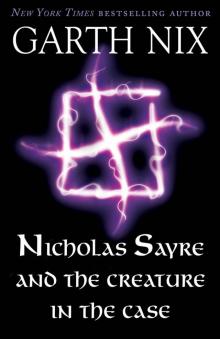 The Creature in the Case
The Creature in the Case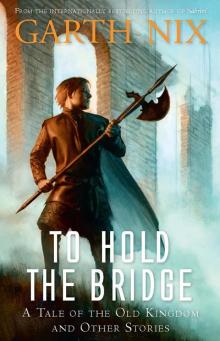 To Hold the Bridge
To Hold the Bridge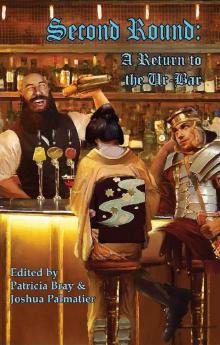 Second Round: A Return to the Ur-Bar
Second Round: A Return to the Ur-Bar Above the Veil
Above the Veil Aenir
Aenir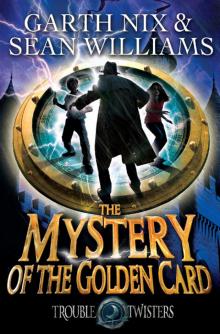 Mystery of the Golden Card
Mystery of the Golden Card Superior Saturday
Superior Saturday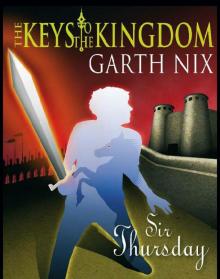 Sir Thursday
Sir Thursday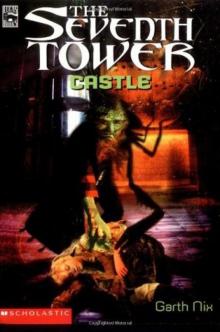 Castle
Castle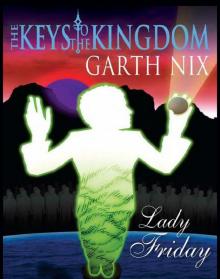 Lady Friday
Lady Friday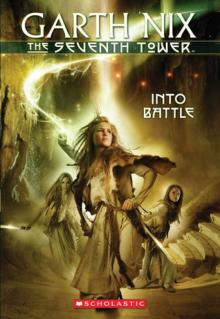 Into Battle
Into Battle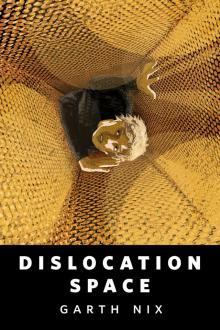 Dislocation Space
Dislocation Space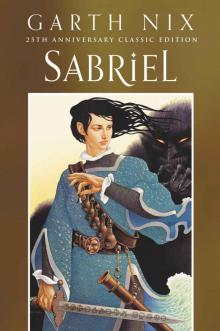 Sabriel (Old Kingdom Book 1)
Sabriel (Old Kingdom Book 1) Sir Hereward and Mister Fitz Go to War Again shamf-1
Sir Hereward and Mister Fitz Go to War Again shamf-1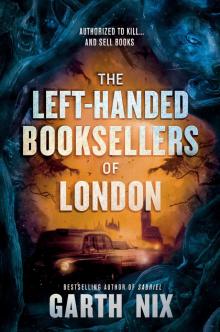 The Left-Handed Booksellers of London
The Left-Handed Booksellers of London Novel - A Confusion of Princes
Novel - A Confusion of Princes One Beastly Beast
One Beastly Beast A Suitable Present for a Sorcerous Puppet shamf-3
A Suitable Present for a Sorcerous Puppet shamf-3 Beyond the Sea Gates of the Scholar Pirates of Sarsköe shamf-2
Beyond the Sea Gates of the Scholar Pirates of Sarsköe shamf-2 Have Sword, Will Travel
Have Sword, Will Travel Fire Above, Fire Below
Fire Above, Fire Below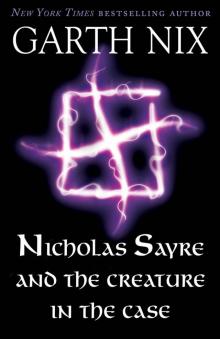 Nicholas Sayre and the Creature in the Case
Nicholas Sayre and the Creature in the Case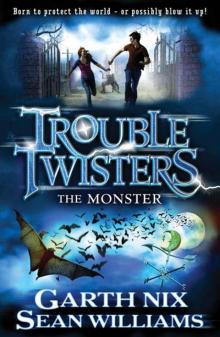 The Monster (Troubletwisters)
The Monster (Troubletwisters)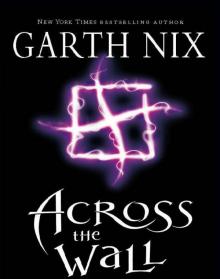 Across the Wall
Across the Wall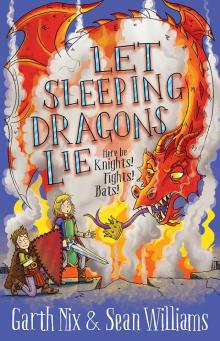 Let Sleeping Dragons Lie
Let Sleeping Dragons Lie![[Abhorsen 03a] - Across the Wall Read online](http://i1.bookreadfree.com/i2/04/12/abhorsen_03a_-_across_the_wall_preview.jpg) [Abhorsen 03a] - Across the Wall
[Abhorsen 03a] - Across the Wall